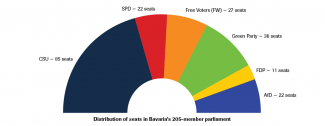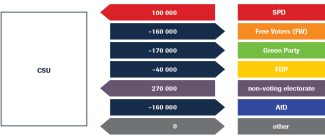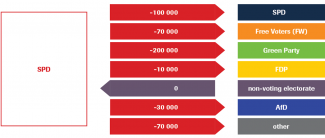Local election in Bavaria – failure for the CSU and the SPD, a triumph for the Green Party
On 14 October residents of Bavaria, one of Germany’s richest federal states, elected 205 members of the local parliament. First place was once again taken - unalterably since 1954 - by the CSU, which garnered 37.2% of the votes. However, the support level for it fell as much as 10.4 percentage points as compared to 2013. Second place, with 17.5% support, was taken by the Green Party (+8.9 percentage points). The Free Voters (Freie Wähler, a party formed by independent candidates) was supported by 11.6% of residents of Bavaria (+2.6 percentage points). The AfD, with 10.2% support, came fourth to find itself in another local parliament (it is now present in 15 out of 16). The SPD was backed by only 9.7% of the voters and sustained very serious losses (-10.9 percentage points). The FDP managed to return to the local parliament in Munich with a 5.1% support level (+1.8 percentage points). The Left Party once again failed to reach the election threshold, garnering 3.2% of the votes (+1.1 percentage points), and will not be represented in the landtag. Voter turnout was much higher than 5 years ago and reached 72.4% (+8.5 percentage points).
Commentary
- Even though the support level for the CSU was higher than suggested by pre-election polls, it will be insufficient for the party to continue governing the federal state by itself. The prime minister of Bavaria, Markus Söder (CSU), will have to make efforts to form a coalition. The most likely coalition partner is the Free Voters party (FW) whose ideological profile is very close to that of the CSU and who were treated as an alternative by voters unsatisfied with the Christian Democrats’ work. The political agenda of the FW is focused above all on regional politics. In aggregate, the two groupings have 112 out of the 205 seats, which would ensure a stable majority to the government. A possible CSU-FW coalition will not affect the balance of powers in the Bundesrat where the CDU/CSU-SPD grand coalition which governs Germany has no majority.
- One of the main reasons for the poor result achieved by the CSU was the strong rivalry for the support of conservative voters from Freie Wähler and the nationalist conservative party Alternative for Germany (AfD). Other factors which had a negative impact on the Bavarian Christian Democrats’ result included: disputes inside the government coalition on the federal level and the personal animosity and conflict between the CSU leaders. Focusing on the consequences of the migration crisis in the election campaign also failed to bring the expected growth of support levels. The CSU’s result was also influenced by structural changes linked to the ageing of society and changes in voters’ habits. The number of people who have no constant political affiliation is growing, and a section of the electorate vote against the mainstream parties, thus intending to express their dissatisfaction with the status quo. The percentage of Catholic voters is also decreasing at a regular rate as numerous residents of other federal states are moving to Bavaria, while two thirds of Bavarian Catholics vote for the CSU.
- The Green Party owes it record-high result to its consistent focusing on environmental protection and social issues, the absence of burdens linked to participation in the government coalition on the federal level and, finally, the positively viewed changes in the party leadership that were introduced after the election to the Bundestag in 2017. Its electorate was also mobilised ahead of the election in Bavaria by such factors as street protests against the CSU’s bill intended at passing a stricter act on the federal state’s police. The SPD’s blandness also took its toll. Statistics concerning shifts in voter support show that the Green Party has taken 210,000 votes from the Social Democrats.
- Some politicians will be held personally accountable in consequence of the election result in Bavaria, but it will take some time before this happens. According to the Bavarian constitution, the newly elected parliament has 22 days to be established and then one week to elect the minister-president. A preliminary agreement between potential coalition partners must be developed by 12 November. However, after this deadline Horst Seehofer (CSU) will most likely lose his position as party leader. An outburst of dissatisfaction directed against party leader Andrea Nahles is also possible inside the SPD. The results of another local election, in Hesse on 28 October, will also influence the personnel debate. Low support levels for the CDU and the SPD in Hesse may fuel demands for a change in both parties and weaken the position of Chancellor Angela Merkel ahead of the election of the CDU leader scheduled for 8 December this year. The problems all leaders of the grand coalition are experiencing will lead to more tension and instability of the government in Berlin and, as a consequence, may even bring about the downfall of the coalition.
Distribution of seats in Bavaria’s 205-member parliament
 Source: Infratest dimap for ARD
Source: Infratest dimap for ARD
Shifts in voter support from/to CSU to/from other parties
 Source: Infratest dimap for ARD
Source: Infratest dimap for ARD
Shifts in voter support from/to SPD to/from other parties
 Source: Infratest dimap for ARD
Source: Infratest dimap for ARD





